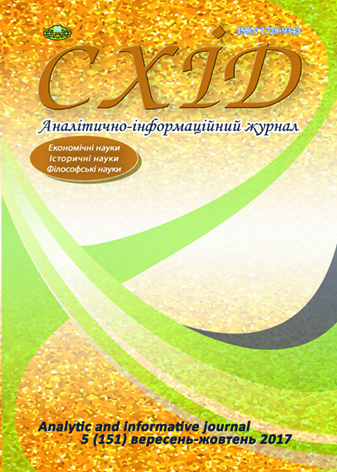The Ukrainian language and culture in global polyphony: current state and prospects
DOI:
https://doi.org/10.21847/1728-9343.2017.5(151).113284Keywords:
national identity, linguo-cultural dynamics, global socio-cultural environment, bilingualism, global competitionAbstract
The article represents the research of the existing stage of Ukrainian language and cultural development, aims both to reveal the peculiarities of up-to-date linguistic and cultural dynamics and to provide the analysis of practical experience of the contemporary nations in terms of protection and preservation their cultural identity.
The authors evaluate the influence of globalization processes on the development of national language and culture, outline the prospects for development of the Ukrainian national identity in the conditions of global competition of different language and cultural systems and make the conclusion that globalization and competition of different linguistic and cultural traditions provide significant impetus for the renewal and development of the Ukrainian language and culture, the growth of its information resource and expansion of functional sphere of the Ukrainian language.
As a result of investigating the current state and peculiarities of Ukraine's linguistic and cultural dynamics, the authors emphasize the fact, that the peculiarities of the modern Ukrainian language and cultural situation are characterized by the spread of the phenomenon of "bilingualism" among a significant part of its citizens and recapitulate that in the conditions of global competition of different linguistic and cultural traditions, Ukrainian round-the-clock multimedia news sites, various analytical, information-thematic, search-abstract and entertaining Internet resources actively promote the representation of national and cultural identity of the country, represent Ukraine as a modern, independent, and authentic nation.Downloads
References
Shulga, N.I. (2000), Basic principles and values of European standards of language policy, in Materials of the round-table talks «Draft laws on languages - expert analysis», Kiyv, pp. 7-22. (rus).
Mayboroda, O. M. and Shulga, M.I. and Gorbatenko, V.P. (2008), Language situation in Ukraine: between conflict and consensus, Institute for Political and Ethnic Studies of National Academy of Sciences of Ukraine named after I.F. Kuras, 398 p. (ukr).
Ukrainebegan to speak more Ukrainian, Russian - less (research results), Portal of language policy. Internet Media Company, available at: http://language-policy.info/2016/06/v-ukrajini-pochaly-bilshe-rozmovlyaty-ukrajinskoyu-rosijskoy-menshe-doslidzhennya/ (ukr).
Migrants have to study English before arriving in Britain(report), BBC Ukraine. Web site of the Ukrainian service of the British Broadcasting Corporation, available at: http://www.bbc.com/ukrainian/news-38518990?ocid=socialflow_facebook (ukr).
The Latvian railway was fined for inscriptions in Russian, RBC-Ukraine. Ukrainian Information Portal, available at: https://styler.rbc.ua/ukr/zhizn/latviyskuyu-zheleznuyu-dorogu-oshtrafovali-1483685742.html (ukr).
InMoldova, buses and trains stop using the Russian language, Portal of language policy. Internet Media Company, available at: http://language-policy.info/tag/inozemnyi-dosvid/ (ukr).
Tajikistan: Russified surnames in ethnic Tajik documents will be corrected, Internet portal Radio Free Europe / Radio Liberty, available at: https://www.radiosvoboda.org/a/news/27707150.html (ukr).
Sevilla fined Yevgen Konoplyanka for not knowing the Spanish language, ZAXID.NET. Information and analytical Internet publication, available at: https://zaxid.net/sevilya_oshtrafuvala_yevgena_konoplyanku_za_neznannya_ispanskoyi_movi_n1389884 (ukr).
The German government is drafting a law that will force refugees to learn German, EuroProduct. News Internet resource, available at: http://www.eurointegration.com.ua/news/2016/03/28/7046907/ (ukr).
Kazakhstanis preparing to go to the Latin alphabet, Global Analyst. Information Internet portal, available at: http://www.global-analityk.com/ (ukr).
2 billion rubles will be spent to promote the Russian language abroad, Internet portal of RBK TV channel, available at: http://www.rbc.ru/politics/01/06/2015/556bb32a9a79477e402a4624 (rus).
Elistratov, V.S. (2004), Globalization and the national language, Bulletin of Moscow University, Series 19, Linguistics and Intercultural Communication, 4, pp. 21- 28. (rus).
Azhnjuk, B. (2002), Linguistic aspects of globalization in Ukraine, in Linguistic conflicts and harmonization of society: Materials of the scientific conference, 28-25 (May), Publishing and printing center «Kyiv University», Kyiv, pp. 144-150. (ukr).
Zasursky, Y. N., Global Information Space in the Conditions of Mobile Communication, available at: http://mediascope.ru/node/162 (rus).
Vozniak, T. (2000), Globalization as a Challenge to Humanity, «Ї», pp. 27-48. available at: http://www.ji.lviv.ua/ji-library/Vozniak/polit-kuchma/globalizac.htm (ukr).
Historical yearly trends in the usage of content languages for websites, Thе W3techs report on the historical trends in the usage of content languages since January 2011, available at: https://w3techs.com/technologies/history_overview/content_language/ms/y
Downloads
Published
How to Cite
Issue
Section
License
Copyright (c) 2017 Andrii Kurguzov, Ludmila Kompaniets

This work is licensed under a Creative Commons Attribution-NonCommercial-NoDerivatives 4.0 International License.
1. Authors bear responsibility for the accuracy of facts, quotations, numbers and names used.
2. Manuscripts are not sent back.
3. The publisher does not always agree with the authors' opinion.
4. The authors reserve the right to authorship of the work and pass the first publication right of this work to the journal under the terms of a Creative Commons Attribution-NonCommercial-NoDerivatives 4.0 International License. This license allows others to distribute (copy) the published work for non-commercial purposes, provided there is mandatory attribution to its authors and a link to the first publication in our journal.
5. The authors have the right to conclude separate supplement agreements that relate to non-exclusive work distribution in the form in which it has been published by the journal (for example, to upload the work to the online storage of the journal or publish it as part of a monograph), provided that the reference to the first publication of the work in this journal is included.

